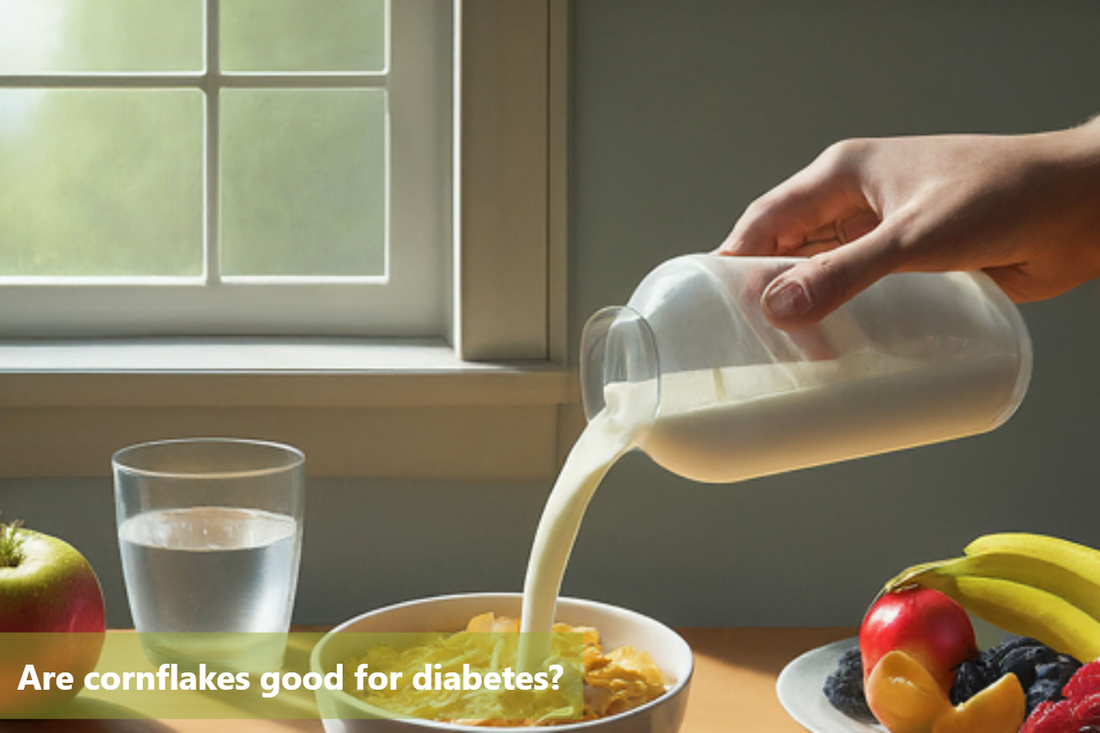Diabetes is a chronic condition that affects glucose processing, with type 2 diabetes being most common. Managing diabetes with a healthy diet is crucial. It's important for those with diabetes to choose food mindfully for a balanced diet. When managing diabetes, dietary considerations are key. One debated breakfast option is cornflakes and its suitability for diabetes. This blog explores cornflakes' nutrition, impact on blood sugar, expert opinions, and research findings for a diabetes-friendly diet. Alternative breakfast options suited for diabetes will also be suggested for convenience and informed food choices.
Nutritional Information of Cornflakes
Calories |
130 |
Fat |
0.4g |
Carbs |
28g |
Protein |
2.6g |
Effects of Cornflakes on Blood Sugar Levels
Rapid Spike in Blood Sugar Levels: Studies have shown that cornflakes, due to their high glycemic index, can cause a rapid spike in blood sugar levels after consumption. This spike can be concerning for individuals with diabetes as it can lead to difficulties in managing their condition effectively.
Unfavorable Effect on Blood Sugar Control: Experts suggest that individuals with diabetes should be cautious about consuming high-glycemic foods like cornflakes as they can have unfavorable effects on blood sugar control. Consistently elevated blood sugar levels from such foods can lead to complications associated with diabetes, highlighting the need for better breakfast options for blood sugar management.
Alternatives to Cornflakes for Diabetics
When it comes to a diabetes-friendly breakfast, it's important to choose options that not only provide convenience but also contribute to managing blood sugar levels effectively. Here are some alternatives to cornflakes that can be more suitable for individuals with diabetes:
Greek Yogurt with Berries: A serving of plain Greek yogurt topped with fresh berries like raspberries or blueberries can be a great alternative to cornflakes. Greek yogurt is high in protein and low in carbohydrates, while berries are packed with fiber and antioxidants, making this a nutritious and blood sugar-friendly option.
Oatmeal with Nuts: Opting for a bowl of oatmeal topped with a sprinkle of chopped nuts such as almonds or walnuts provides a hearty and filling breakfast. Oatmeal is a good source of soluble fiber, which can help regulate blood sugar levels, while nuts offer healthy fats and protein.
Vegetable Omelette: Whisking up a vegetable omelette using ingredients like spinach, bell peppers, and tomatoes can provide a satisfying and nutrient-dense breakfast. The combination of vegetables and eggs delivers a good balance of vitamins, minerals, and protein without causing spikes in blood sugar.
Chia Seed Pudding: Creating a chia seed pudding using unsweetened almond milk and a dash of cinnamon offers a low-carbohydrate, high-fiber breakfast alternative. Chia seeds are rich in fiber and can help stabilize blood sugar levels.
By choosing these alternatives, individuals with diabetes can enjoy a breakfast that not only aligns with their dietary needs but also supports their overall health and well-being. Making mindful choices in the morning sets the tone for better blood sugar management throughout the day.
Key points:
Cornflakes may not be the best choice for individuals with diabetes due to high carbohydrates and low fiber content.
Prioritize foods with low glycemic index to manage blood sugar levels effectively.
Consider opting for whole grain cereals or oatmeal for more fiber and fewer carbohydrates.
Mind portion sizes and pair breakfast options with a source of protein to regulate blood sugar levels.
Explore other breakfast alternatives for better blood sugar management and a healthier lifestyle.
Consult with healthcare professionals or registered dietitians for personalized dietary recommendations.
Making informed choices about breakfast can help individuals with diabetes regulate blood sugar levels and improve overall well-being.
FAQs:
Is cornflakes a good breakfast option for individuals with diabetes?
Answer: While cornflakes may seem like a healthy choice, they are high in carbohydrates and low in fiber, which can spike blood sugar levels. Therefore, individuals with diabetes should consume cornflakes in moderation.
Can cornflakes be part of a diabetes-friendly diet?
Answer: Cornflakes can be included in a diabetes-friendly diet, but it is important to pair them with proteins or healthy fats to help stabilize blood sugar levels. Opt for whole grain options and watch portion sizes.
Are there any healthier alternatives to cornflakes for people with diabetes?
Answer: Yes, there are several healthier alternatives to cornflakes for individuals with diabetes, such as oatmeal, bran flakes, or muesli. These options are higher in fiber and lower in added sugars.
Do flavored cornflakes affect blood sugar levels differently?
Answer: Flavored cornflakes usually contain more sugar and artificial additives, which can cause a quicker spike in blood sugar levels. It is best to choose plain cornflakes and add your own toppings like fresh fruits and nuts.
How should individuals with diabetes customize their cornflake serving to manage blood sugar?
Answer: To better manage blood sugar levels when consuming cornflakes, individuals with diabetes can consider adding protein sources like Greek yogurt or eggs, and incorporating healthy fats such as nuts or seeds to slow down the absorption of carbohydrates.
This Blog post is an initiative by DiabeSmart, to provide accurate and Nutritionist / Doctor approved information related to Diabetes. DiabeSmart is India's first Food brand designed specifically for Diabetics, that has been clinically tested on Diabetics and Pre-Diabetics to deliver 55% - 70% lower Sugar spikes. DiabeSmart is part of Lo! Foods - India's leading brand for Everyday Functional Health foods.













